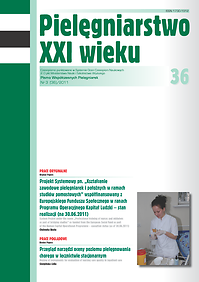Health behaviors in elderly population
Keywords:
positive and negative health behaviors, preventive behaviors, elderly peopleAbstract
Introduction. The percentage of old people has been increasing in the societies of the developed countries. The analysis of Polish demographic data showed that during last 50 years the index of elderly people doubled. Therefore, the Polish society may be ranked among populations of the elderly. Health behaviors are defined as individual index of one’s attitude towards health. They also may include habits or attitudes resulting from acknowledged cultural values.
Factors determining if the period of old age is comfortable, depend on lifestyles, disease prevention, and early treatment of diseases. Activities promoting health aim at helping the elderly function independently as long as possible.
Aim. Evaluation of health behaviors of the elderly students of the University of the Third Age.
Material and methods. The study group comprised 88 old people from Sanok district. A questionnaire developed by the authors was used together with a standardized research tool i.e. Juszczynski Inventory of Health Behaviors (IZZ).
Results. The respondents aged from 60 to 81 years. More than half of the study group (64%) declared they cared about their nutrition, 66% said they avoided salt and products rich with salt while 74% of participants didn’t smoke. Only six percent of the respondents weren’t treated because of any chronic disease. Cardiovascular diseases including arterial hypertension and ischemic heart disease were the most frequent. The respondents also suffered from sleep disorders, rheumatoid diseases and diabetes.
Gathered data indicated that 53.0% of the study group had regular medical appointments, and 80.0% of the participants observed physician’s instructions regarding positive health behaviors.
Conclusions. Data obtained from the study group indicated that behaviors beneficial for one’s health included correct nutritional habits e.g. avoiding salt in diet, avoiding food containing chemical preservatives, and eating whole-wheat bread.
Preventive behaviors included regular medical appointments, observing physician’s instructions, and constant education about health. The elderly had positive mental attitude toward their lives. As a result they supported their families and close friends in many ways, not only financially. Health practical attitudes beneficial for one’s health included avoiding smoking and having optimal time for rest and sleep.
References
1. Banaszkiewicz M, Andruszkiewicz A. Zachowania zdrowotne. [w:] Banaszkiewicz M, Andruszkiewicz A, red. Promocja zdrowia. Tom I. Lublin: Wyd. Czelej; 2008.
2. Baranowicz I, Majchrowska A, Kawczyńska – Butrym Z. Elementy socjologii dla pielęgniarek. Lublin: Czelej; 2000.
3. Jabłoński L, Wysokińska - Miszczuk J. Podstawy gerontologii i wybrane zagadnienia z geriatrii. Lublin: Wyd. Czelej; 2000.
4. Ziarko J, Wybraniec A. Starość jako dar i zadanie. Pielęgniarstwo XXI wieku. 2008; 2-3 (23-24): 28-32.
5. Juczyński Z. Inwentarz Zachowań Zdrowotnych. [w:] Juczyński Z, Narzędzia pomiaru w promocji i psychologii zdrowia. Warszawa: Wyd. Pracownia testów psychologicznych Polskiego Towarzystwa. 2001.s. 112 – 122.
6. Kwapisz U, Gyrko KB, Majchrzak K, Głodowski J. Zdrowotne i psychospołeczne aspekty funkcjonowania osób w starszym wieku. Pielęgniarstwo XXI wieku. 2005; 4(13): 79-82.
7. Wieczorkowska-Tobis K, Talarska D, red. Geriatria i pielęgniarstwo geriatryczne. Warszawa: Wyd. PZWL; 2008.
8. Kędziora- Kornatowska K., Muszalik M.: Kompendium pielęgnowania pacjentów w starszym wieku. Lublin: Wyd. Czelej; 2007.
9. Zielińska – Więczkowska H, Kędziora – Kornatowska K. Jakość życia chorych z pierwotnym nadciśnieniem tętniczym w wieku podeszłym na tle uwarunkowań zdrowotnych (część II). Pielęgniarstwo XXI wieku. 2007; 2 (19): 38-42.
10. Jabłoński L, Karwat ID. Podstawowe problemy zdrowotne społeczeństwa polskiego na początku u XXI wieku. [w:] Jabłoński L, Karwat ID, red. Podstawy epidemiologii ogólnej, epidemiologia chorób zakaźnych. Lublin: Wyd. Czelej; 1999.s.275–279.
11. Karczewski JK. Higiena. Wyd. Czelej, Lublin 2002.
12. Kachaniuk H., Adamczyk K., Kruk M. Styl życia długowiecznych. Annales Universitatis Mariae Curie-Skłodowska. Lublin Polonia. 2005: Vol. XL, suppl. XVI, 454, sectio D: 8–10.
Downloads
Published
Issue
Section
License
Copyright (c) 2011 Ewa Smoleń, Lucyna Gazdowicz, Anita Żyłka-Reut (Autor)

This work is licensed under a Creative Commons Attribution 4.0 International License.




